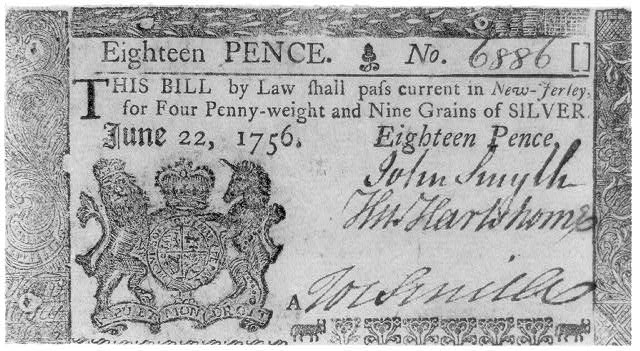October 12 history blog post: One of a series of short essays to provide the cultural, political and geographical context for the 1766 travelers.
From Salome Meuer’s journal: On the first day of the 1766 journey, Brother Ettwein asked the girls “ if anyone was without silver in their purse. There were five who had none, each of whom he gave a shilling.”
In the 17th and 18th centuries, there was no standardization of currency in the American colonies. Under British rule, the colonies did not have the right to mint their own currency; they were expected to use British pounds. However, much of that made its way back to England for the purchase of imports, which left the colonists to rely on barter or Spanish currency. Records of the Moravians in North Carolina, 1752-1771 includes extracts from the Bethabara ledger for 1762, which lists exchange rates and average prices.
One Spanish milled dollar was worth:
In Virginia – 5 shillings, 9 pence
In Pennsylvania – 7 shillings, 9 pence
In North Carolina – 8 shillings, 9 pence
In South Carolina – 1 pound, 11 shillings
The Bethabara residents needed to know all of these rates for their travel back and forth to Pennsylvania and for their trade in the port of Charleston, South Carolina.

Some of the retail prices in 1762:
Bushel of corn: 2 shillings
Bushel of wheat: 3 shillings, 6 pence
Bushel of dried beans: 3 shillings
Pound of coffee: 1 shilling, 4 pence
Pound of tea: 8 shillings, 8 pence
50 pounds of tobacco: 18 shillings, 10 pence
Pound of wool: 1 shilling, 8 pence
Some wages were listed as well:
1 day mowing for hay: 2 shillings, 4 pence
1 day killing hogs: 2 shillings
1 day threshing: 2 shillings
Weaving linen, per 8 yards: 4 shillings, 7 pence
The term “pieces of eight” originated with the use of the Spanish silver dollar coin. When change was required, the coin was cut into eight pieces. This is also the basis for the term “two bits” to signify a quarter-dollar.
Virginia S. Hart A’75
Resources:
Adelaide Fries, ed., Records of the Moravians in North Carolina Volume I, 1752-1771
Money in Colonial Times, https://www.philadelphiafed.org/education/money-in-colonial-times
